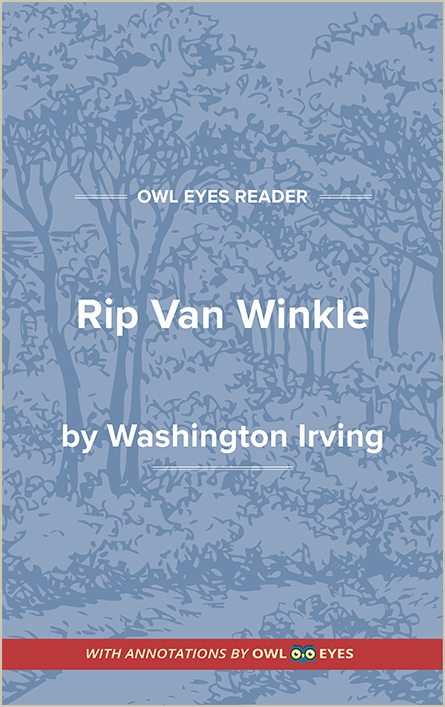Analysis Pages
Themes in Rip Van Winkle
National Identity: Washington Irving was deeply invested in questions of American identity. He was born the week his family learned of the ceasefire that ended the Revolutionary War, and was himself named for George Washington. Despite spending a large portion of his adult life in Europe, Irving remained dedicated to the cause of the United States. He was the first internationally read and respected American author and the first author to write explicitly about America in a fictional context. As such, it is natural that questions regarding the nature of national and personal identity should permeate his stories. The ease with which Rip slips out of time during such a key moment in American history, and the relative ease with which he is able to rejoin the life of his village, speaks to the potential for disassociation between personal and national identities.
Historical Veracity: By using a frame narrative and involving multiple narrators in Rip’s story, Irving requires his readers to ask questions about truth and the role of the recorder in composing a region’s history.
Themes Examples in Rip Van Winkle:
Rip Van Winkle
🔒"Nicholas Vedder? why, he is dead and gone these eighteen years!..." See in text (Rip Van Winkle)
"He doubted his own identity, and whether he was himself or another man...." See in text (Rip Van Winkle)
"the first discoverer of the river and country, kept a kind of vigil there..." See in text (Rip Van Winkle)
"swelling up to a noble height, and lording it over..." See in text (Rip Van Winkle)
"precise counterpart of himself..." See in text (Rip Van Winkle)
"Rip’s daughter took him home to live with her; she had a snug, well-furnished house, and a stout cheery farmer for a husband, whom Rip recollected for one of the urchins that used to climb upon his back. As to Rip’s son and heir, who was the ditto of himself, seen leaning against the tree, he was employed to work on the farm; but evinced an hereditary disposition to attend to any thing else but his business...." See in text (Rip Van Winkle)
"The red coat was changed for one of blue and buff, a sword was held in the hand instead of a sceptre, the head was decorated with a cocked hat, and underneath was painted in large characters, “GENERAL WASHINGTON.”..." See in text (Rip Van Winkle)
"there was every hill and dale precisely as it had always been..." See in text (Rip Van Winkle)
"a strange figure slowly toiling up the rocks..." See in text (Rip Van Winkle)
"the muttering of one of those transient thunder-showers..." See in text (Rip Van Winkle)
"what excuse shall I make to Dame Van Winkle?..." See in text (Rip Van Winkle)
"He was observed, at first, to vary on some points every time he told it..." See in text (Rip Van Winkle)
"the changes of states and empires made but little impression on him..." See in text (Rip Van Winkle)
"There was a wooden tombstone in the churchyard that used to tell all about him, but that’s rotten and gone too...." See in text (Rip Van Winkle)
"a fact, handed down from his ancestor, the historian, that the Kaatskill mountains had always been haunted by strange beings..." See in text (Rip Van Winkle)
"what courage can withstand the evil-doing and all-besetting terrors of a woman’s tongue?..." See in text (Rip Van Winkle)
"there was something strange and incomprehensible about the unknown, that inspired awe, and checked familiarity..." See in text (Rip Van Winkle)
"The old gentleman died shortly after the publication of his work..." See in text (Rip Van Winkle)

